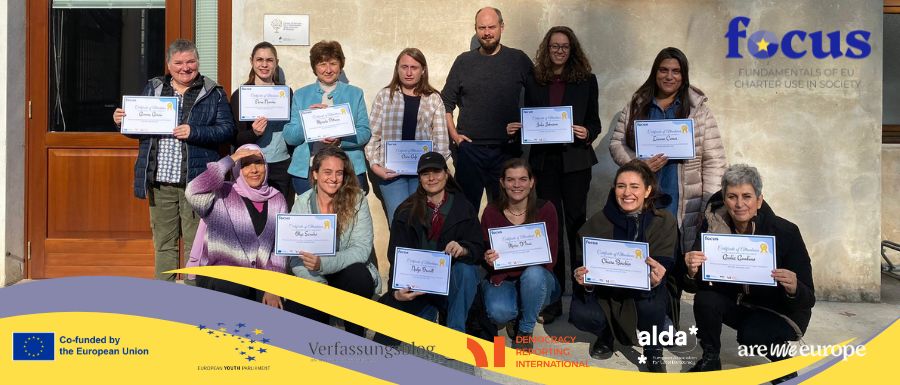From November 13 to 15, 2024, the FOCUS Project, funded by the European Commission, hosted an International Training of Multipliers at Centro Di Servizio Per Il Volontariato (#ALDAMember) in Vicenza, Italy. The event aimed to promote the EU Charter of Fundamental Rights and equip project partners with the knowledge, tools and strategies to implement capacity-building activities locally. By emphasising the Charter as a key instrument for advancing human rights, strengthening democracy and protecting fundamental freedoms, the training enhanced participants’ understanding of its applications, enabling them to drive impactful initiatives in their communities.
The event was led by Jakub Jaraczewski, Research Coordinator at Democracy Reporting International, and organised by ALDA. Over the course of three days, participants engaged in an intensive program that combined theoretical insights, real-world case studies, and practical strategies for promoting and protecting fundamental rights. The training provided a collaborative space where stakeholders could exchange knowledge and develop actionable approaches to integrate the Charter into their advocacy efforts.
Understanding the Charter and its Impact through Case Studies and Practical Applications
The first day of the training introduced the EU Charter of Fundamental Rights, delving into its history, purpose, and key provisions. Participants explored its role in safeguarding civil and political rights, gaining a deeper understanding of how the Charter can be effectively applied in various contexts. To ground the discussion in real-world issues, the day featured an in-depth case study, “Electricity Meters in Rome Districts,” which examined discriminatory electricity meter placements in marginalised communities in Rome. This case highlighted systemic inequality, raising critical questions about equal access to public services and legal remedies available to affected residents.
The second day shifted toward practical implementation strategies, focusing on economic, social, and cultural rights. Participants explored capacity-building techniques designed to support local authorities (LAs) and communities, ensuring that advocacy and legal frameworks align with national and regional regulations. The discussions were further enriched by the case study “Retirement Challenges for Urban Farmers,” which explored the legal and social barriers faced by elderly agricultural workers in urban environments. This session emphasised the need for policy adjustments and social protections to ensure that vulnerable groups are not left behind.
Advocacy, Local Implementation, and EU Funding
The final day was dedicated to advocacy strategies and European funding opportunities, equipping participants with practical tools to drive change. A crucial component of the session was the case study “The so-called ‘LGBT-free’ Zones in Poland,” which examined the exclusionary policies affecting LGBTQ+ communities. This discussion reinforced the importance of grassroots advocacy, strategic litigation, and EU legal frameworks in combating discrimination and promoting inclusivity.
To ensure long-term impact, the training concluded with a comprehensive session on EU funding mechanisms, offering insights into how financial resources can support local human rights initiatives. Participants learned how to navigate funding applications, identify relevant grants, and secure financial support for their advocacy efforts. By empowering stakeholders with these resources, the FOCUS Project aims to ensure that human rights work remains sustainable and effective in the long run.
Looking Ahead: Strengthening Democracy through the Charter
By equipping key stakeholders with the tools, knowledge, and strategies to advocate for fundamental rights, the FOCUS Project is fostering a more informed and engaged society. The training in Vicenza represents an opportunity in ensuring that the EU Charter of Fundamental Rights is not just a legal document, but a living framework that actively protects and empowers individuals across Europe.
With ongoing collaboration among its partners, the project is laying the foundation for a stronger, rights-based democratic culture at all levels of society. As participants return to their respective countries, they carry with them enhanced expertise and practical strategies to drive meaningful change within their communities, making the Charter a powerful tool for justice, equality, and democracy.
